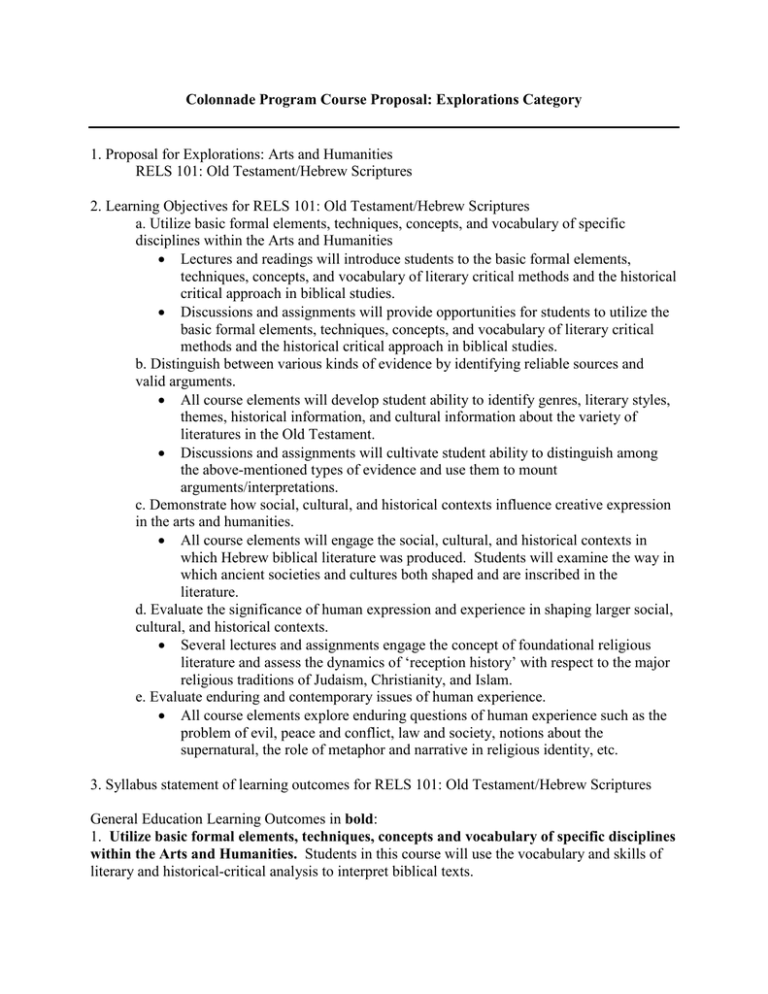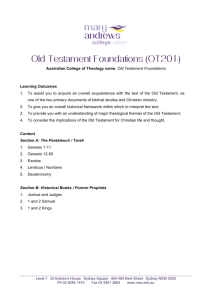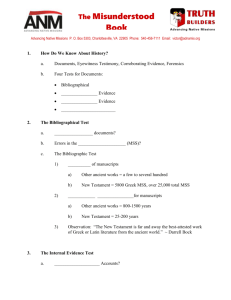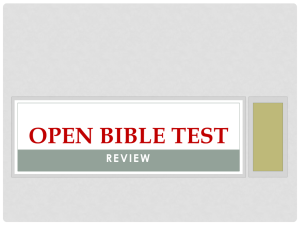Colonnade Program Course Proposal: Explorations Category RELS 101: Old Testament/Hebrew Scriptures
advertisement

Colonnade Program Course Proposal: Explorations Category 1. Proposal for Explorations: Arts and Humanities RELS 101: Old Testament/Hebrew Scriptures 2. Learning Objectives for RELS 101: Old Testament/Hebrew Scriptures a. Utilize basic formal elements, techniques, concepts, and vocabulary of specific disciplines within the Arts and Humanities • Lectures and readings will introduce students to the basic formal elements, techniques, concepts, and vocabulary of literary critical methods and the historical critical approach in biblical studies. • Discussions and assignments will provide opportunities for students to utilize the basic formal elements, techniques, concepts, and vocabulary of literary critical methods and the historical critical approach in biblical studies. b. Distinguish between various kinds of evidence by identifying reliable sources and valid arguments. • All course elements will develop student ability to identify genres, literary styles, themes, historical information, and cultural information about the variety of literatures in the Old Testament. • Discussions and assignments will cultivate student ability to distinguish among the above-mentioned types of evidence and use them to mount arguments/interpretations. c. Demonstrate how social, cultural, and historical contexts influence creative expression in the arts and humanities. • All course elements will engage the social, cultural, and historical contexts in which Hebrew biblical literature was produced. Students will examine the way in which ancient societies and cultures both shaped and are inscribed in the literature. d. Evaluate the significance of human expression and experience in shaping larger social, cultural, and historical contexts. • Several lectures and assignments engage the concept of foundational religious literature and assess the dynamics of ‘reception history’ with respect to the major religious traditions of Judaism, Christianity, and Islam. e. Evaluate enduring and contemporary issues of human experience. • All course elements explore enduring questions of human experience such as the problem of evil, peace and conflict, law and society, notions about the supernatural, the role of metaphor and narrative in religious identity, etc. 3. Syllabus statement of learning outcomes for RELS 101: Old Testament/Hebrew Scriptures General Education Learning Outcomes in bold: 1. Utilize basic formal elements, techniques, concepts and vocabulary of specific disciplines within the Arts and Humanities. Students in this course will use the vocabulary and skills of literary and historical-critical analysis to interpret biblical texts. 2. Distinguish between various kinds of evidence by identifying reliable sources and valid arguments. Students in this course will identify and produce arguments with appropriate supporting data. 3. Demonstrate how social, cultural, and historical contexts influence creative expression in the arts and humanities. Students in this course will identify how religious literature is produced in specific cultural and historical contexts. 4. Evaluate the significance of human expression and experience in shaping larger social, cultural, and historical contexts. Students in this course will evaluate how social location and life experience shape interpretation of religious literature and impact the development of major religious movements. 5. Evaluate enduring and contemporary issues of human experience. Students in this course will engage in the comparative study of religion and culture through examination of enduring human issues in ancient Near Eastern religious literature. 4. Departmental Assessment of RELS 101: Old Testament/Hebrew Scriptures A. An essay question will be added to the final exam in the course. The question will require students to 1. Demonstrate familiarity with the basic formal elements, techniques, concepts, and vocabulary of the discipline of Old Testament Studies. 2. Demonstrate familiarity with at least one ancient literary genre and/or subgenre that is found among the books of the Old Testament, and with at least one strategy for reading this genre in its historical setting, and to be able to use this knowledge to distinguish between various kinds of evidence by identifying reliable sources and valid arguments. 3. Demonstrate how social, cultural, and historical contexts of at least one potion of the Old Testament have influenced it. 4. Demonstrate, through the notion of a “canon” of Scripture, how at least one portion of the Old Testament has served as an important factor in shaping larger social, cultural, and historical contexts. 5. Demonstrate how at least one portion of the Old Testament has served as an important factor in contributing to the understanding at least one enduring and contemporary issue of human experience. B. At the end of the semester to be assessed, the answers of 30% of the students in each section of the course will be selected at random for assessment. C. At least two faculty members will assess each answer. The names of the students and of the instructors for the sections will be eliminated before the assessment takes place. D. Answers will be given one of four designations. 1. Excellent – The student has demonstrated proficiency in all outcomes. 2. Good – The student has demonstrated proficiency in most outcomes. 3. Fair – The students has demonstrated proficiency in some outcomes. 4. Poor – The students has demonstrated proficiency in no outcomes. E. The results will be tabulated and given to the Department Head. F. The Department Head will convene the relevant faculty to review the results and to determine what steps, if any, need to be taken in order to improve the instruction in course. 5. Number of sections each semester: 1-2 sections. 6. Sample syllabus enclosed. RELS 101: Old Testament / Hebrew Scriptures The Isaiah Scroll (1QIsaa) found in Cave 1 of Qumran “YHWH and his Asherah” – drawing & paleo-Hebrew inscription ~ Kuntillet Ajrud, Israel Dr. Lilly E-mail: ingrid.lilly@wku.edu Office: Cherry Hall 319B Office Hours: Wed 9-10 and 1:40-3:00; or appointments by request Graduate Assistant: Kayla Baldwin, kayla.baldwin954@topper.wku.edu Course Description: Catalogue Description: “An introduction to the historical, literary, and cultural approaches to the Hebrew Bible (Old Testament) with a view toward understanding and interpretation.” The “Old Testament” / “Hebrew Scriptures” refers to a collection of texts that were shaped by Hebrew people and written by Hebrew scribes over a long period of time during the first millennium B.C.E. Over 400 years later, beginning in the 1st century C.E., Jewish and Christian groups chose specific texts to serve as sacred canons for their religions. We will use this canon (called the Protestant “Old Testament” or the Jewish “Tanakh”) as our source text, although the canon is tremendously diverse, covers a huge span of history, stems from different geographical locations, and represents on-going reform and religious questioning. While this is a tall task, the course will attempt to introduce this dynamic body of Old Testament literature. This course is an introduction to the Old Testament/Hebrew Scriptures. The learning goals are two-fold: 1) to understand the world of Israel and the Ancient Near East in which the texts were produced. Such understanding is gained through study of the culture, religion, politics, and history of Israel and its neighbors. This is referred to as an historical-critical approach to the Old Testament; and 2) to develop skills in literary analysis. For the historicalcritical approach, this means exploring theories of the literature’s formation, historical contexts, the role of myth and oral story-telling, the emergence of religious traditions, and many more types of observations about Israel’s religious literature. Hence, we will attempt to understand the Old Testament from an historical/literary perspective. In all things, the course works within a critical-thinking framework where all presuppositions and assumptions are subject to investigation and critique. A classroom in which critical-thinking sets the tone and ethos for learning will not always feel comfortable. Indeed, students are encouraged to engage ideas in the classroom during appropriate moments in my lectures and of course in Discussion section. But one can hardly imagine how to penetrate this 3,000 year old corpus of religious literature without the art and skill of critical thinking. Outline of Course: I. Ancient Near Eastern Literary Context – the Bible in its World II. Pentateuch – Diversity of Authorship in the “Torah of Moses” III. Deuteronomistic History – Social Rise of Kingship and Narrative Analysis IV. Prophets – Religious Protest Poetry within Israel’s Historical, Political, and Social Context Course Materials John J. Collins, A Short Introduction to the Hebrew Bible (Minneapolis: Fortress, 2007) The New Oxford Annotated Bible with Apocrypha, New Revised Standard Version, College Edition Select readings on Blackboard under “Course Documents” – indicated on the “Schedule” with the symbol (BB). Including several selections from Bill Arnold and Bryan Beyer, Readings from the Ancient Near East (Grand Rapids, Mich.: Baker, 2002) [optional to purchase]. Learning Outcomes: After taking this course, the student will be able to: a. Identify how religious literature is produced in specific cultural and historical contexts. b. Use skills of literary and historical-critical analysis to interpret biblical texts. c. Engage in the comparative study of religion and culture through examination of enduring human issues in ancient Near Eastern religious literature. d. Identify and produce arguments with appropriate supporting data. e. Evaluate how social location and life experience shape interpretation of religious literature and impact the development of major religious movements. Course Requirements: 1. 2. 3. 4. 5. 6. Reading, Preparation, and Attendance Friday Discussion and Analysis Papers Exam #1 – Ancient Near Eastern Literature about Creation and Flood Exam #2 – Pentateuch Exam #3 – Deuteronomistic History Exam #4 – Prophets 1) Regular Class Reading, Preparation, and Attendance Students should be prepared to contribute to class discussion by reading all assigned material for that day. It is true that students will enjoy more success, get more out of the material, and be better prepared for the exams and discussions when they do the daily readings and attend all lectures. Hence, attendance may be taken at any time to help encourage students to stay on top of these regular elements. The student’s notes from class-lectures comprise an extremely important framework for success on the exams (as do the the assigned readings.) The professor will not provide lecture notes for missed classes; it is the student’s responsibility to borrow notes from a colleague in the course for any days missed. The professor, at her discretion, may lower student’s grade for a poor record of attendance (more than two lectures missed). 2) Friday Discussion Sections and Analysis Papers The discussion sections allow students to enjoy a a discussion-oriented setting in which to engage the course material in a more reflective, critical, creative, and focused setting. Discussion sections are mandatory for successful completion of the course. Attendance and assignments are mandatory, and will be marked, weekly. For each discussion meeting, students are to complete the assignment and prepare a 2-3 page, typed analysis paper. Each paper is different, so be attentive to each specific assignment. Each paper will be assigned in class during the week, so stay tuned for weekly instructions. Failing to turn in a paper results in a zero for that paper. Papers will not be accepted outside of that day’s discussion section, with no exceptions. Only excused absences, according to University policy, will be considered for accommodations. In such a situation, the student has one week from the missed session to turn in the paper; after that date, the paper receives a zero. 3) Four Exams #1 – Ancient Near Eastern Literary Context #2 – Pentateuch #3 – Deuteronomistic History #4 – Prophets The course is divided into four sections: “Ancient Near Eastern Literary Context,” “Pentateuch,” “Deuteronomistic History,” and “Prophets.” The examinations will come at the end of these major sections of the course. A review sheet will be distributed for the exam within the week prior. Each exam will consist of two sections: terms and quotes. The terms are a list of the most important concepts used in the lectures and reading. The quotes are taken straight from the Old Testament (or other primary course text, like an Ancient Near Eastern myth). The quote sections will require students to discuss the quote in its literary context as well as its significance to the larger issues raised by the course. Students with a University approved excuse for missing the exam must contact the professor immediately to make prior arrangements. The student has one week from the original exam date to write the exam. In all other cases, missing an exam results in a zero. Schedule: (ɃɃ) on Blackboard site under “Course Documents” Monday AUGUST 27 Introduction to the Course What is the Bible and how do you study it academically? Wednesday AUGUST 29 Story, Truth, and the Bible: Exodus Exercise Due: Exodus 7-20 SEPTEMBER 3 Friday AUGUST 31 Historical-Critical Approach Due: Collins, “Introduction,” 1-14. SEPTEMBER 5 Ancient Near Eastern Literary Context SEPTEMBER 7 Discussion Section Due: (ɃɃ) Dornbusch, “Beer: The Midwife of Civilization” Collins, “The Near Eastern Context,” 15-27 (chap 1) Due: (ɃɃ) Arnold & Beyer, “Enuma Elish,” pp. 31-44 (stop at the gap in the text on p. 44) Discussion Paper SEPTEMBER 12 Two Genesis Creation Stories SEPTEMBER 14 Discussion Section Genesis 1 & 2 ~ No Class: Labor Day ~ SEPTEMBER 10 Multiple Authorship of the Pentateuch Due: Collins, “The Nature of Pentateuchal Narrative,” 2835 (chap 2) SEPTEMBER 17 Two Flood Stories Due: Collins, “Primeval History,” 3643 (chap 3) Genesis 1-3 SEPTEMBER 19 Ancient Near Eastern Floods Due: Discussion Paper SEPTEMBER 21 Due: Genesis 6-9 Due: (ɃɃ) Arnold & Beyer, “Epic of Atra-khasis,” 21-31 SEPTEMBER 24 What are Ancestral Narratives? The Significance of the Jacobstories SEPTEMBER 26 Women’s Stories and Abraham SEPTEMBER 28 Discussion Section Narratives about ancestors Due: (ɃɃ) Niditch, “The Mothers and Fathers of Israel,” 18-29 Genesis 12-22 Due: Discussion Paper Due: Collins, “The Patriarchs,” 44-54 (chap 4) Genesis 25:19 – 33:20 ~ EXAM #1 ~ Monday Wednesday OCTOBER 1 Moses and the Birth of a New Community OCTOBER 3 Covenants Due: (ɃɃ) Arnold & Beyer, “Autobiography of Sargon,” 75-76 Collins, “The Exodus from Egypt,” 55-63 (chap 5) Exodus 1-15 OCTOBER 8 The Revelation at Sinai Due: TBA Due: Collins,“The Revelation at Sinai,” 64-73 (ch 6) Exodus 19-24 OCTOBER 15 OCTOBER 10 Deuteronomy and Israel’s Covenant Model for Yahwism Due: Collins, “Deuteronomy,” 84-93 (chap 8) Deuteronomy OCTOBER 17 Introduction to the Deuteronomistic History ~ Exam # 2 ~ OCTOBER 22 Kingship and Charisma in Israel: Saul Due: Collins, excerpt on Saul, 116-120 1 Samuel 8-15 OCTOBER 29 Transitions: David to Solomon Due: I Kings 1-2 Due: No assignment – refresh after exam study OCTOBER 24 Kingship Charisma is Israel: Rise of David Due: Collins, excerpts on David, 120122 Collins, “Ch. 12 Second Samuel” 123-130 1 Samuel 16 – end of 2 Samuel Friday OCTOBER 5 ~ No Class: Fall Break ~ OCTOBER 12 Discussion Section Examples of the Growth of Legal Material in Exodus to Deuteronomy Due: Discussion Paper OCTOBER 19 Discussion Section Making David a Hero: Bathsheba and Uriah Due: Discussion Paper OCTOBER 26 Discussion Section Saul’s Facebook Page Due: Discussion Paper OCTOBER 31 Kingship and Nation-Building: Solomon’s State NOVEMBER 2 Discussion Section David’s Facebook Page Due: Collins, “Ch. 13: First Kings 116,” 131-140 I Kings 1-16 Due: Discussion Paper Monday Wednesday NOVEMBER 5 NOVEMBER 7 Two Doctors and a Hip Hop “Teacher” ~ Exam #3 ~ Friday NOVEMBER 9 ~ No Class: Conference ~ NOVEMBER 12 Israel’s History as Backdrop to Prophecy Due: (ɃɃ) Gravett et. al. Opposition to Monarchy and the Dissolution of the State NOVEMBER 19 Due: No assignment – refresh after exam study NOVEMBER 14 Amos NOVEMBER 16 Discussion Section Amos: history and concepts Due: Collins, “Ch. 15: Amos and Hosea,” 153-163 Amos 1-9 Due: Discussion Paper NOVEMBER 21 NOVEMBER 23 ~ No Class: Conference and Thanksgiving ~ NOVEMBER 26 Hosea Due: (ɃɃ) Gale Yee, “Hosea” Hosea 1-14 DECEMBER 3 Jeremiah at the Dawn of Exile Due: Collins, “Ch. 17: The Babylonian Era: Jeremiah and Lamentations,” 174-184. Jeremiah, esp. chs. 15, 21, 37-43 NOVEMBER 28 Isaiah of Jerusalem NOVEMBER 30 Discussion Section Due: Collins, “Ch. 16: Isaiah,” 164173 Isaiah 1-39 DECEMBER 5 Ezekiel’s Visions from Babylon Due: Discussion Paper Due: Collins, “Ch. 18: Ezekiel,” 185196 Ezekiel chs. 1-39 FINAL EXAM WEEK December 10-15 ~ Exam #4: TBA ~ DECEMBER 7 EXILE: Identity, Recovery, and Hope Due: TBA




